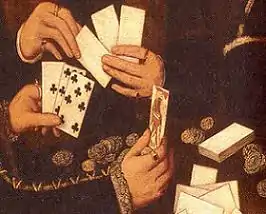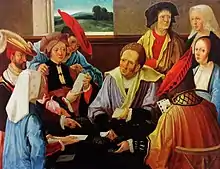Noddy (card game)
Noddy (O.F. naudin[1]) also Noddie, Nodde or Knave Noddy, is a 16th-century English card game ancestor of Cribbage. It is the oldest identifiable card game with this gaming structure and thus probably also ancestral to the more-complicated 17th-century game of Costly Colours.
 | |
| Origin | England |
|---|---|
| Family | Matching |
| Players | 2-4 |
| Skills required | Calculation |
| Cards | 52 |
| Deck | English |
| Playing time | 30 min. |
| Random chance | Medium |
| Related games | |
| Cribbage, Costly Colours | |
History
The earliest reference to the game of Noddy in the Oxford English Dictionary dates from 1589. The basic term noddy, means a fool or simpleton, but in the gaming sense, it is just the name given to the Knave of the suit turned up at the start of play.
A very interesting description of the game can be found in Randle Holme's The Academy of Armory, written in 1688, which displays previously unrecorded scoring features and terminology.[2]
Cribbage without the Crib
Noddy can be thought of as the "small Cribbage without the Crib". But it would seem that the game of Noddy was played for counters, and that it was fifteen or twenty-one up, as quoted by Shirley.[3] In a play of Middleton's, Christmas, speaking of the sports of that time as children, says that the game was played for thirty one.[4] And in Salton's Tales[5] the game was depicted as being played for twenty one. It is probable, however, that it was played all the three ways, as 15, 21 and 31 points at the choice of the players.
Edmund Gayton (Festivous Notes upon Don Quixot, 1654) speaks of noddy boards, but Robert Nares in A Glossary: or Collection of words, phrases, names and allusions to customs, proverbs, &c (1822) says that Noddy was not played with a board,[6] which seems to be plausible due to the natural evolution of card games.
Gameplay
Noddy is a game for two or four players - the latter presumably partners - receiving each 3 cards from a 52-card pack ranking from Ace (low) to King (high). The object of the game is to peg points for making combinations both in the hand and in the play up to 31 over as many deals as it takes. A23 is a valid sequence, but AKQ isn't. Whoever cuts the lower card deals first.
Combinations
- Knave Noddy - Jack of the trump suit: 1 (or 2 to non-dealer if it's turned up)
- Point-counts
- Fifteen (two or more cards totalling 15): 1 per card.
- Twenty-five (three or more cards totalling 25): 1 per card.
- Thirty-one, or 'Hitter' (four or more cards totalling 31): 1 per card.
- Pairs
- Pair (two cards of the same rank): 2
- Pair royal, or prial (three of the same rank): 6
- Double pair royal (all four of a rank): 12
- Runs (Sequences)
- Run of three: 2
- Run of four: 4
- Run of 5 or more: 1 per card.
- Flushes
- Three or more cards of the same suit: 1 per card.
Terminology
In the game, certain cards have peculiar names and scores, like "Flatback" (K♠) 6, "Countenance" (Q♥) 4, "Roger" (J♥) 5, and "Knave Noddy" - name applied to the Knave of the suit turned up at the start of the play - scores 2 to the dealer.
The earliest reference to the game in the Oxford English Dictionary, dates from 1589. It is now presumed extinct, although Parlett published its rules in 2008.[7]
See also
References
- A Glossary and Etymological Dictionary of Obsolete and Uncommon Words)
- The Academy of Armory: 2 or 4 may play at it, 61 being up. Each perſon hath 3 cards and one turned up to which he makes as many casts as he can. They are thus merkett, Flat back or King of Spads is six, Countenance or Queen of Hearts, four, Knave of the trump, 2, Knave of Hearts 5, a pair 4, pair Riall 12, a pair Taunt 24. Every 15 as you can make is 2, and every 25 is 2. In playing down the cards you have the same advantage of 15, 25, paires &c. and the next to 31 hath 1 cast, if he make 31, there is 2 casts.
- Hide Park -
He is upon the matter then fifteen,
A game, at Noddy - Inner Temple Mask -
I leave them wholly to my eldest son Noddy, whom, during his minority,
I commit to the custody of a pair of knaves and one and thirty. - Saltonstall's Pictures, char. 9 -
A young heire is a gamester at noddy; one-and-twenty makes him out;
if he have a flush in his hand, expect him shortly to shew it, without hiding his cards." - Once a Week, Eneas Sweetland Dallas vol. X p. 364 - Bradbury & Evans, London, Dec-Jun 1864
- Parlett 2008, p. 429/430.
Literature
- Festivous notes on the History and adventures of the renowned Don Quixote by - 1768
- Parlett, David (2008). The Penguin Book of Card Games, Penguin, London. ISBN 978-0-141-03787-5
External links
| Wikisource has the text of the 1911 Encyclopædia Britannica article Cribbage. |

